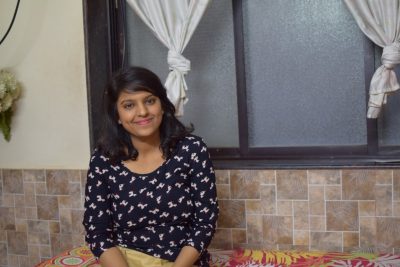In spite of the hectic schedule, numerous quizzes and assignments and the sacrosanct deadlines, Sweta Singh, an FPM student at XLRI managed to publish her book of poems, ‘An Egghead’s Journal.’ In this candid conversation, she tells us about her journey and shares some tips for the budding writers who dare enough to take the road less travelled.  Q. Tell us something about yourself. How did you end up pursuing FPM from XLRI?
Q. Tell us something about yourself. How did you end up pursuing FPM from XLRI?
So I was born and raised in the Steel City of Bhilai, Chhattisgarh, and one thing common about every parent in a Steel City is that the education of their kids is their sole priority. So you hardly see people making career choices apart from medicine or engineering. But fortunately, the trend is changing now. As I was inclined towards Social Sciences and I chose Economics. I did my under-graduation from Symbiosis School of Economics, Pune, and then pursued my masters from Madras School of Economics, Chennai.

Then I got placed in WNS Global Services as a management trainee and worked there for almost a year and a half. Initially, though I loved my job, I found it very mundane and monotonous. So I wanted to do something new.
Since I always wanted to get into academics one way or the other, I decided to switch my career and became an academic associate at ISB, Hyderabad. There I assisted professors of various fields from Strategy to Economics to Organisational Behaviour and even Marketing and soon realized that I could do some research work as well. So I shifted my base to the Indian School of Business Mohali where I got a proposal for being a researcher. I was working there as a research analyst for over eight months when I got a call from XLRI. I decided that if I'm doing research, why not do a research degree, which can give me a status of being a fellow in program management, so that's why I came here.
Q. Tell us about the book 'An Egghead's Journal.'
I started writing when I was in Chennai. I never wrote anything when I was a child. I never thought of writing what I had in my mind. This was the first time when I started working that I realized I don't have a proper plan, as in, when I was in school or college, I knew that I would be here for a while, I had a perfect idea what I'm supposed to do in the future for at least for three years from now. But this was the first time that I had no clarity of what I'm going to do and what lies ahead. So, therefore, at times, I used to be very anxious. And at times, I used to be very confused as well. So because of those thoughts, in my mind, I started writing.
I started venting them out on a paper, and I realized that I could do pretty well. I've always been very imaginative as a child. So now I was putting all my imagination on a piece of paper, and it helped me. It was more like therapy, I would say, and I felt very, very happy after doing that. So I started writing from there. I continued writing even though I shifted my base to Hyderabad and then later to Mohali. And by then, I realized that I had a good collection of poems. So if you looked into 'An Egghead's Journal,' there are a plethora of moods that are captured by those poems. It's not such that, I'm either happy, sad, amazed or curious. It's a combination of all.
Q. I have seen a lot of people posting their writings on the Internet or a blog. But not many publish their books. How did you take that jump from writing for yourself to print what you are writing?
I think when I started writing, I realized that I could actually show it to other people. I wanted that kind of appreciation. These things are limited to me, right. But then I thought maybe if I'm able to portray to other people, what I think, it's going to help me as well as other people to relate. I love the idea of getting that kind of connection with people or being connected to people in that way. There are a lot of emotions in the book, and I think people can relate to my ideas. So that helped me.
When I started writing, I was initially thinking of keeping it to myself. But then I thought that if I need recognition, and I had the kind of belief that I can write pretty well, I believed that it is vital for me to make other people aware of what I'm doing and what I'm writing. So basically, recognition was something that I was looking for.
Q. What is the process of publishing a book? What has your journey been like?
Basically, there are two kinds of publishing service, one, which is traditional publishers, and the other one, which I opted for was self-publishing. Now, self-publishing can be a little challenging. So actually both kinds of publishing have some challenges associated with them. So for traditional publishers, you need to have a lot of patience. The thing is that most of the traditional publishers will not launch new authors. They go for pretty renowned people, and they take a lot of time to reply to your manuscripts. So if you send your scripts to any of the publishers, they might send you an automated response that they'll get back to you within three months or it may happen that they will never back to you. But again, there are merits of being associated with traditional publishers with the marketing and the recognition that you get. You get a wider scale of people who will read your book.
If you're running out of patience, you can go with the idea of self-publishing. For this too you have to send your manuscript first and these people will see the first few chapters of your book, and then reply. India has around renowned twenty self-publishers as of now. So they will ask you to pay for your writing, as there's usually no sponsorship involved. They'll come in specific packages. So these packages will be involving printing, editing, book cover, and even marketing, and social media management. Now, according to your liking, you can pick any of the packages. They'll then assist you in every step of editing or printing or even media managing and other stuff.
Q. How did you manage both publishing a book and academics simultaneously? An FPM curriculum is quite demanding. How did you balance the two?
The thing is if you are very passionate about something, you will take out time for that, maybe half an hour or maybe one hour in a day. If not every day, but at least on alternate days. The most important fact about writing is that you have to be very consistent. So, if you don't write down words, then it will become like an ancient dream that you had in the past.
So, no matter how good you are at writing, you have to put it on paper, that's the key, you have to be very consistent. I see apart from MBA students go to the gym or pursue some extracurricular activities of their choice. So, try to think it in a way that this is something which gives you a lot of regeneration or a sense of contentment. So, if you believe that this is not an extra task that you need to squeeze it in your schedule but something that releases you from all the stress, I think that's how it's going to help you. So, you don't need to be hard on yourself, but at the same time, make sure that you're not procrastinating that much.
Q. What advice do you have for the budding writers who are currently pursuing an MBA or already have an MBA degree and want to publish their book but are finding it difficult to start?
You can try this activity. Buy a beautiful diary will make you feel like, you know, writing, and open it for the time being. Open the first page. If you don't feel like writing, it’s okay, you can close it again. But the other day, again, try to do that. One day you will definitely feel like writing because you have so many ideas running in your mind.
I believe that a lot of us have a lot of thoughts running in our mind; we think a lot. The only problem is we don't write it; we don't process it. So I think that's the best way. And sometimes people may be running short on time. So there are a lot of apps, which basically can take your voice notes. So try using those things. That's the best thing you can do if you're having a time crunch. You can open these voice notes, just record and later on, you can use those transcripts. And from there, you can try to, you know, edit and then make it a good piece of writing.
And yeah, I think that consistency is the key. You have to be consistent. I believe, as a writer, I procrastinate a lot. We all have this big writer's block many times that stop us from doing what we want to do. Consistency is going to help you improve your imagination, as well.
Q. Currently, are you in the process of writing anything?
Yes, yes. So right now I'm co-authoring a book with Inkopedia. So we are a bunch of co-authors writing about a regular teenage girl, Vinnie and her transition in life and how she takes the challenges. So basically everybody, right now mostly the girls, they have this lot of pressure to look very …
Q. Attractive?
Not attractive, exactly. But then they have to be a 'Mary Sue' that is to be perfect in every way. So not only studies but also how they have to be appealing in every manner. They have to excel in co-curricular activities too, or again, they have to be presentable. So there's a lot of pressure on people, especially in today's youth. So how a person copes with that and what are her anxieties, we have tried to think about it and write it in the form of poems. So I think that's something new that I'm doing right now and am very excited.
I'm not sure when it's going to come, but mostly by September, I think we will be able to finish it and will start with editing and then printing the book. And apart from that, I've been working on my novel, a period drama but I don't know when I will be able to finish it. It's taking a lot of time.




